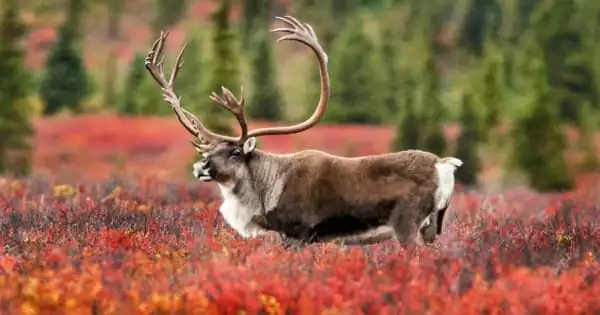According to a study published in the journal PLOS Genetics, reindeer, also known as caribou in North America, make one of the longest seasonal migrations of land animals, but their proclivity to migrate is determined by genetic ancestry.
GPS tracking and DNA sequencing were used by researchers from the University of Calgary, Princeton, Liverpool John Moores, and other institutions to investigate the genetic drivers of migratory behavior in 139 female reindeer (Rangifer tarandus) living in tundra or woodland habitats across western North America.
They discovered more than 50 genetic mutations linked to migratory behavior, 27 of which were found in genes involved in brain activity, fat, and energy metabolism, body development, or hormone production.
Caribou (also known as reindeer in Europe) have one of the longest seasonal migrations of any land animal, but an individual’s proclivity to migrate is determined by genetic ancestry, according to Maria Cavedon of the University of Calgary in Canada and colleagues in a study published Feb. 10 in the open-access journal PLOS Genetics.
We discovered genes associated with migratory behavior and discovered that the proclivity to migrate was determined by the evolutionary history of caribou. If, as we report, genes influence migratory behavior, caribou could be further impacted by the loss of the migratory trait in some isolated populations that are already in decline.
Maria Cavedon
The researchers investigated the genetic factors influencing migratory behavior in 139 female reindeer (Rangifer tarandus) living in tundra or woodland habitats across western North America using GPS tracking and DNA sequencing. They discovered more than 50 genetic mutations linked to migratory behavior, 27 of which were found in genes involved in brain activity, fat, and energy metabolism, body development, or hormone production. The sequences were divided into northerly and southerly subpopulations that descended from ancestral caribou trapped on either side of the Rocky Mountains during the last glaciation.
Despite generations of hybridization since the glaciation ended around 11,000 years ago, the researchers discovered that caribou with a higher proportion of genes from northern ancestry migrated farther. Migratory animals traveled nearly 250 kilometers on average, which is ten times farther than sedentary reindeer. These findings point to an evolutionary legacy from the last glaciation, when northern caribou populations had to migrate to survive in harsh tundra environments, whereas southern caribou populations were more sedentary.

The sequences were divided into northerly and southerly subpopulations that descended from ancestral reindeer trapped on either side of the Rocky Mountains during the last glaciation. Despite generations of hybridization since the glaciation ended around 11,000 years ago, the researchers discovered that animals with a higher proportion of northern ancestry were more likely to migrate longer distances. Migratory animals traveled nearly 250 kilometers per day on average, ten times farther than sedentary reindeer.
The research is the first to look into the genes that influence migration in an endangered terrestrial mammal. Seasonal migrations allow animals to track moving resources or avoid harsh conditions, but they also put them at risk of habitat fragmentation. Ancestral genes for migration may be lost forever if the descendants of northern lineages are driven extinct, but the authors believe that conserving key habitats along their seasonal migration routes may help to preserve the genes underlying the world’s longest terrestrial migration.
“The effects of habitat fragmentation and habitat loss pose a significant threat to wide-ranging animals, including migratory species,” Cavedon adds. “We studied the migratory patterns of GPS-collared endangered caribou in western North America, as well as genomic scans on the same individuals. We discovered genes associated with migratory behavior and discovered that the proclivity to migrate was determined by the evolutionary history of caribou. If, as we report, genes influence migratory behavior, caribou could be further impacted by the loss of the migratory trait in some isolated populations that are already in decline.”
The research is the first to look into the genes that influence migration in an endangered terrestrial mammal.
“The effects of habitat fragmentation and habitat loss pose a significant threat to wide-ranging animals, including migratory species,” said lead author Maria Cavedon. “If, as we report, migratory behavior is influenced by genes, caribou may be further impacted by the loss of the migratory trait in some isolated populations that are already in decline.”
And Prof Mariani added: “The reindeer is an emblematic case: a large land animal whose migratory behaviour has evolved for survival. But the effects of climate change and habitat loss reach farther than just reindeer: similar genetic heritage mechanisms are likely common to many other organisms. If we lose these genetic variants, we’re looking at catastrophic effects on ecosystems.”





